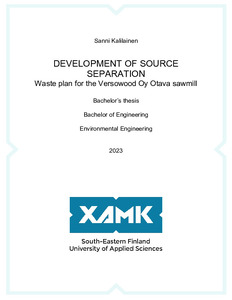Development of source separation : Waste plan for the Versowood Oy Otava sawmill
Kalilainen, Sanni (2023)
Kalilainen, Sanni
2023
All rights reserved. This publication is copyrighted. You may download, display and print it for Your own personal use. Commercial use is prohibited.
Julkaisun pysyvä osoite on
https://urn.fi/URN:NBN:fi:amk-2023121135821
https://urn.fi/URN:NBN:fi:amk-2023121135821
Tiivistelmä
Waste is a global issue and, if handled poorly, can endanger the health of both people and the environment. In accordance with both international agreements and legislation, the generation of waste should be minimized, and recycling should be increased. As defined in the principles of the circular economy, the value of the materials should be preserved, and the materials should be kept in circulation for as long as possible. If the materials can no longer be used as they are, they should be sorted into different types of waste at their place of origin, thus enabling high-quality and efficient material recycling. In the next few years, the waste legislation regarding business activities has also been tightened. Efficiently managed waste management and source separation can also bring financial benefits for the company.
The objective of this thesis was to study the current state of the commissioner's waste management in September of 2023. The research methods used in this thesis were literature review, observations in the commissioner’s property, and interviews with employees and persons responsible for the company’s waste management. In the observations, it was noted that the source separation is not carried out as required by law, and the waste management is not clear and efficient enough for the sorting to be successful. According to the interviews, the employees had different ideas about the state of the commissioner's waste management and the importance of waste sorting. The interviews also revealed that the changes in the waste legislation had not been clarified and thus the waste management did not meet the statutory requirements.
Based on the information received, a waste plan was made for the commissioner to improve and update their waste management. The waste plan included not only the requirements for environmental legislation and their environmental permit but also concrete measures to improve waste management. The final waste plan was drawn up together with the commissioner to meet their needs and wishes.
The objective of this thesis was to study the current state of the commissioner's waste management in September of 2023. The research methods used in this thesis were literature review, observations in the commissioner’s property, and interviews with employees and persons responsible for the company’s waste management. In the observations, it was noted that the source separation is not carried out as required by law, and the waste management is not clear and efficient enough for the sorting to be successful. According to the interviews, the employees had different ideas about the state of the commissioner's waste management and the importance of waste sorting. The interviews also revealed that the changes in the waste legislation had not been clarified and thus the waste management did not meet the statutory requirements.
Based on the information received, a waste plan was made for the commissioner to improve and update their waste management. The waste plan included not only the requirements for environmental legislation and their environmental permit but also concrete measures to improve waste management. The final waste plan was drawn up together with the commissioner to meet their needs and wishes.
